MercoPress. South Atlantic News Agency
Uruguay
-
Tuesday, March 18th 2025 - 08:33 UTC
Uruguayan civil aviation watchdog website hacked

Hackers from Argentina, identified as LaPampaLeaks, BogotaLeaks, and Uruguayo 1337, Monday hit the website of Uruguay’s National Directorate of Civil Aviation and Aeronautical Infrastructure (DINACIA). Using DNS poisoning, they defaced the site, exposing private data of President Yamandú Orsi, such as his phone number and records, as well as those of Agency for Electronic Government and Knowledge Society (Agencia del Gobierno Electrónico y Sociedad del Conocimiento - Agesic) Security Director Mauricio Papaleo.
-
Monday, March 17th 2025 - 08:48 UTC
Uruguay's Health Ministry launches vax campaign

Uruguay's Public Health Ministry (MSP) launched its 2025 vaccination campaign, focusing on influenza, measles, and respiratory syncytial virus (RSV) to address seasonal and emerging health challenges, it was announced in Montevideo.
-
Friday, March 14th 2025 - 10:04 UTC
New euthanasia bill submitted before Uruguayan Congress
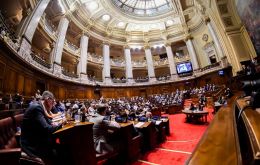
Uruguayan lawmakers submitted a new euthanasia bill before the Lower House, reviving a proposal already passed there in 2022 but stalled in the Senate. The bill, introduced by deputies from the Colorado Party (PC) and the ruling Brooad Front (Frente Amplio - FA), is supported by a multiparty coalition including members of the Partido Nacional and Partido Independiente. The initiative seeks to allow assisted death for individuals with terminal, incurable, and irreversible diseases.
-
Thursday, March 13th 2025 - 19:25 UTC
Uruguayan President backtracks on horsetaming restrictions
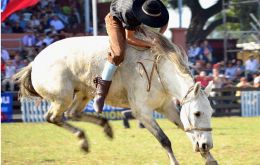
Uruguayan President Yamandú Orsi suspended for 180 days a regulation passed last month by the previous administration of Luis Lacalle Pou concerning the National Institute of Animal Welfare (INBA) to prioritize animal welfare in horsetaming (jineteadas). The newly-inaugurated head of State said the measure approved last Feb. 10 was too strict to rural sectors, forcing them to cancel several traditional events.
-
Wednesday, March 12th 2025 - 20:47 UTC
UN Chief to visit Uruguay before the end of the year

Uruguayan Foreign Minister Mario Lubetkin announced that UN Secretary-General António Guterres would be visiting the South American country “before the end of the year.” Uruguay's top diplomat made those remarks after meeting with the Portuguese official, with whom he discussed health, peace, and environment issues for about 40 minutes.
-
Wednesday, March 12th 2025 - 09:32 UTC
Uruguayan troops in DRC to return home starting late this month
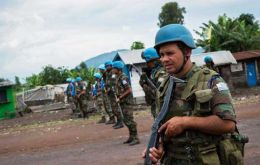
Uruguay's Foreign Minister Mario Lubetkin confirmed that his country's military mission in the Democratic Republic of Congo as part of a UN peacekeeping force will return home between late March and early April 2025. Lubetkin made the announcement after meetings in New York with UN Secretary-General Antonio Guterres and Under-Secretary-General for Peace Operations Jean-Pierre Lacroix. The relief of Uruguayan troops will be carried out in stages, it was also explained.
-
Tuesday, March 11th 2025 - 09:55 UTC
Belgian Customs seize 547 kilos of cocaine in container shipped from Montevideo
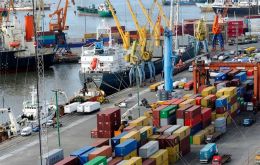
Customs officials in Antwerp, Belgium seized some 547 kilos of cocaine inside a container with rice that left the port of Montevideo. The catch took place at the end of February and involved the vessel Grande Nigeria, belonging to the Grimaldi Group, according to Uruguayan prosecution sources.
-
Thursday, March 6th 2025 - 10:59 UTC
Uruguay wants to become an “actor of peace”
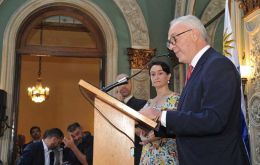
Uruguayan Foreign Minister Mario Lubetkin had on Wednesday his first formal day in office on Wednesday. During a ceremony in Montevideo attended by President Yamandú Orsi and Vice President Carolina Cosse, the South American country's top diplomat emphasized Uruguay's role as an “actor of peace” to help reduce global tensions.
-
Wednesday, March 5th 2025 - 09:12 UTC
China halts meat imports from Brazil, Argentina, Uruguay, and Mongolia

China’s customs authorities have suspended beef imports from seven meatpacking facilities across Brazil, Argentina, Uruguay, and Mongolia as of March 3, 2025. The affected companies include two Argentine exporters (Frigorífico Regional General Las Heras SA and Frio Dock SA), three Brazilian slaughterhouses (Frisa Frigorífico Rio Doce S/A, Bon-Mart Frigorífico Ltda, and JBS S/A), one Uruguayan facility (Frigorífico Sirsil SA), and a Mongolian supplier. No official reason for the measure was provided, though it follows a 2024 record of 2.87 million metric tons of beef imports, which led to an oversupplied market and historically low domestic beef prices in China.
-
Tuesday, March 4th 2025 - 20:19 UTC
Uruguay's new government does not recognize Maduro or González Urrutia in Venezuela

Under the Broad Front (Frente Amplio - FA) presidency of Yamandú Orsi, Uruguay will no longer recognize Venezuelan opposition leader Edmundo González Urrutia as winner of the controversial July 28 elections, where the incumbent Nicolás Maduro emerged triumphant amid fraud allegations. Foreign Minister Mario Lubetkin also underlined that Montevideo did not recognize Maduro either.
